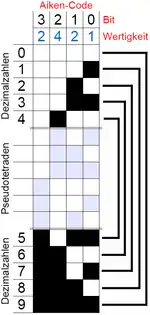Aiken code
The Aiken code (also known as 2421 code)[1][2] is a complementary binary-coded decimal (BCD) code. A group of four bits is assigned to the decimal digits from 0 to 9 according to the following table. The code was developed by Howard Hathaway Aiken and is still used today in digital clocks, pocket calculators and similar devices.
| Aiken code | |
|---|---|
| Digits | 4[1][2] |
| Tracks | 4[1][2] |
| Digit values | 2 4 2 1[1][2] |
| Weight(s) | 0..4[1][2] |
| Continuity | no |
| Cyclic | no[1][2] |
| Minimum distance | 1[1][2] |
| Maximum distance | 4[1][2] |
| Redundancy | 0.7 |
| Lexicography | yes[1][2] |
| Complement | 9[1][2] |
The Aiken code differs from the standard 8421 BCD code in that the Aiken code does not weight the fourth digit as 8 as with the standard BCD code but with 2.


The following weighting is obtained for the Aiken code: 2-4-2-1.
One might think that double codes are possible for a number, for example 1011 and 0101 could represent 5. However, here one makes sure that the digits 0 to 4 are mirror image complementary to the numbers 5 to 9.
| Aiken code | |||
|---|---|---|---|
| Decimal digit |
Aiken 2 4 2 1 code[1][2] | ||
| 0 | 0 0 0 0 | ||
| 1 | 0 0 0 1 | ||
| 2 | 0 0 1 0 | ||
| 3 | 0 0 1 1 | ||
| 4 | 0 1 0 0 | ||
| 5 | 1 0 1 1 | ||
| 6 | 1 1 0 0 | ||
| 7 | 1 1 0 1 | ||
| 8 | 1 1 1 0 | ||
| 9 | 1 1 1 1 | ||
See also
References
- Steinbuch, Karl W., ed. (1962). Taschenbuch der Nachrichtenverarbeitung [Handbook for Signal Processing] (in German) (1 ed.). Berlin / Göttingen / New York: Springer-Verlag OHG. pp. 71–74. LCCN 62-14511.
- Steinbuch, Karl W.; Weber, Wolfgang; Heinemann, Traute, eds. (1974) [1967]. Struktur und Programmierung von EDV-Systemen [Handbook for Information Systems - Volume II - Structure and programming of computer systems]. Taschenbuch der Informatik – Band II (in German). Vol. II (3 ed.). Berlin, Germany: Springer Verlag. pp. 98–100. ISBN 3-540-06241-6. LCCN 73-80607.
Further reading
- White, Garland S. (October 1953). "Coded Decimal Number Systems for Digital Computers". Proceedings of the Institute of Radio Engineers. Institute of Radio Engineers (IRE). 41 (10): 1450–1452. doi:10.1109/JRPROC.1953.274330. eISSN 2162-6634. ISSN 0096-8390. S2CID 51674710. (3 pages)